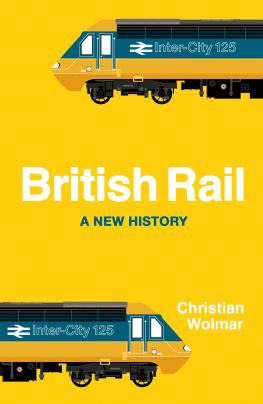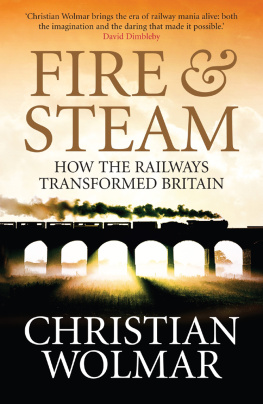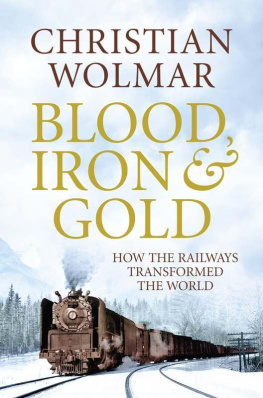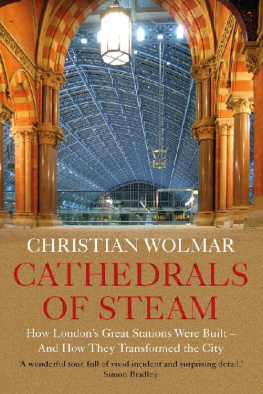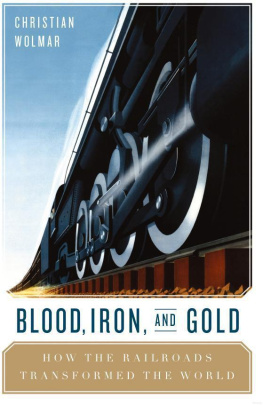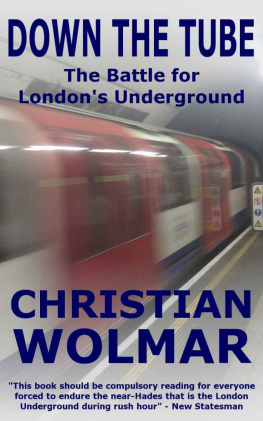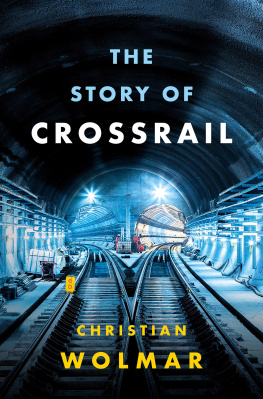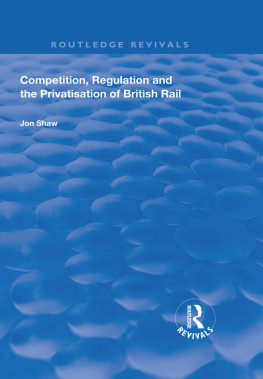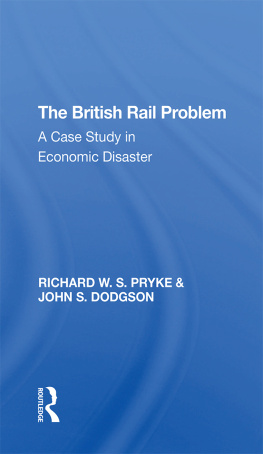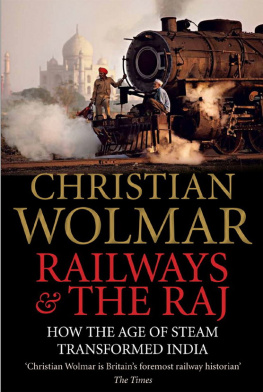Christian Wolmar
BRITISH RAIL
A New History

PENGUIN BOOKS
UK | USA | Canada | Ireland | Australia
New Zealand | India | South Africa
Penguin Books is part of the Penguin Random House group of companies whose addresses can be found at global.penguinrandomhouse.com.

First published by Michael Joseph in 2022
Copyright Christian Wolmar, 2022
Picture credits can be found on
The moral right of the author has been asserted
ISBN: 978-0-241-45621-7
This ebook is copyright material and must not be copied, reproduced, transferred, distributed, leased, licensed or publicly performed or used in any way except as specifically permitted in writing by the publishers, as allowed under the terms and conditions under which it was purchased or as strictly permitted by applicable copyright law. Any unauthorized distribution or use of this text may be a direct infringement of the authors and publishers rights and those responsible may be liable in law accordingly.
To my grandsons, Luka and Quinn, and my step-grandsons, Alfie and Louie, who hopefully will all love the railways as much as I do.
Introduction
The public image of British Railways is permeated by a series of clichs. Passengers were forced to eat curly-ended stale sandwiches and their trains were delayed by the wrong kind of snow.
Lets just dispose of these two famous tropes. While there may, in the early days of BR, have been some stale sandwiches which were made available on the counter of the various cafs, on display under a glass dome, they were disposed of at the end of the day, long before they could develop curly edges. For the most part, the staleness of British Railways sandwiches was just used as the butt of oft-repeated jokes from stand-up comedians and in sitcoms. In fact, British Railways brought in expert chefs and well-known foodies such as Clement Freud and Prue Leith, who actually became a British Railways Board director, and the organization pioneered the idea of shrink-wrapped sandwiches.
As for the wrong kind of snow, no BR executive ever uttered that much-repeated phrase. It originated in an interview by James Naughtie on BBC Radio 4s Today programme in February 1991 after a spell of very cold weather had delayed trains across the network. British Rails Director of Operations, Terry Worrall, was asked to comment on the adverse effects of the heavy snowfall and explained that we are having particular problems with the type of snow, which is rare in the UK, because it was powdery and far colder than usual. Naughtie then cheekily suggested, Oh, I see, it was the wrong kind of snow, which Worrall refuted, merely emphasizing it was a different kind of snow. This exchange was then picked up by the London Evening Standard, which splashed across its front page that British Rail blames the wrong type of snow, and it swiftly became a media clich.
These are only the two most notorious myths surrounding British Railways. I mention them here because they are still important in setting the tone of much coverage of BR and yet bear no relation to any measured assessment of the organizations achievements and failings. Even as I wrote this introduction in the summer of 2021, Grant Shapps, the Transport Secretary, revived one of these tropes when announcing the restructuring of the industry, saying we wont be going back to the days of British Rail and its terrible sandwiches. There are plenty more similar myths examined in this book: the trains were never on time; the stations were dirty; the staff unhelpful; and the management out of its depth. These portrayals of a state-run industry that provided a vital service were important in creating the climate of public opinion which led to its privatization in the 1990s, just as the tales of straight bananas and banning double-decker buses influenced the referendum on membership of the European Union in 2016.
Despite this constant undermining of its efforts to provide a good railway service, British Railways was the last significant privatization of the Conservative era which ran from 1979 to 1997, because of fears that the publics affection for the organization would make it an unpopular move. And so it proved. The public may well have been critical of British Railways as an organization, but they did not really want their trains messed about with by some buccaneering capitalists who might slash and burn, as Beeching had done a generation previously. Therefore, despite the oft-repeated criticisms, British Railways remained relatively popular with the public and politicians feared a backlash if it were privatized. As a result, contrary to many peoples recollection, it was not Margaret Thatcher who sold off the railway, as she had been aware of the particularly strong feelings that the British have about trains.
It was, therefore, left to her successor, John Major, to do the deed. The Conservative manifesto for the 1992 general election, which they were not expected to win, contained a few scant lines on the privatization of the railway, but contained no details as to how this would be done. The rushed sell-off that ensued dismantled an organization which had, after half a century of existence, created a workable structure that had delivered a much improved service. The unified integrated structure was split into more than 100 sections, governed by a system which was far more expensive to operate and ultimately proved unworkable.
It was such an embarrassment to its creators that in John Majors 900-page autobiography, published almost a decade after he left office, there is barely a mention of what was one of his most contentious and high profile policies. In researching a TV programme on which I appeared, the producer wrote to Major asking for an explanation of the reasoning behind rail privatization. Surprisingly, the programme received a fairly comprehensive answer, in which Major set out the reasons behind the break-up and sale in a letter dated 15 May 2008:
Some critics have claimed that British Rail was privatised for ideological reasons. This is nonsense. The impetus for privatisation was my wish to improve public services.
I thought British Rail was inefficient; had been inadequately funded for 50 years; was hidebound by tradition; and poorly managed. In the aftermath of privatisation, the appalling state of the nationalised service is often forgotten.
I believed a transfer to the private sector would improve British Rail through the use of private sector skills, thereby making it possible to raise funds for investment from the market, in sums a publicly-funded railway could never have managed. This was, of course, essential to the improvement of every aspect of British Rails services. In short: my purpose was to produce a better railway.
He goes on to make points about the structure of the industry:
This structure was determined after widespread consultation. Initially I was in favour of a vertically-integrated rail system, but persuasive arguments encouraged me to move away from that concept. I was influenced by the fact that the safest transport industry in the country was also the most fragmented: namely Civil Aviation. The Airlines lease their aircraft; Airports are in multiple ownership; Air traffic control is another separate entity. Overall, the airline industry is sub-divided into far more component parts than was the railway following privatisation.
I did not believe the British Rail monolith was the best model for the industry. These days, every part of industry is disaggregated with more specialisation, sub-contracting and flexibility than ever before. It would have been odd if British Rail had not followed a similar structure.

